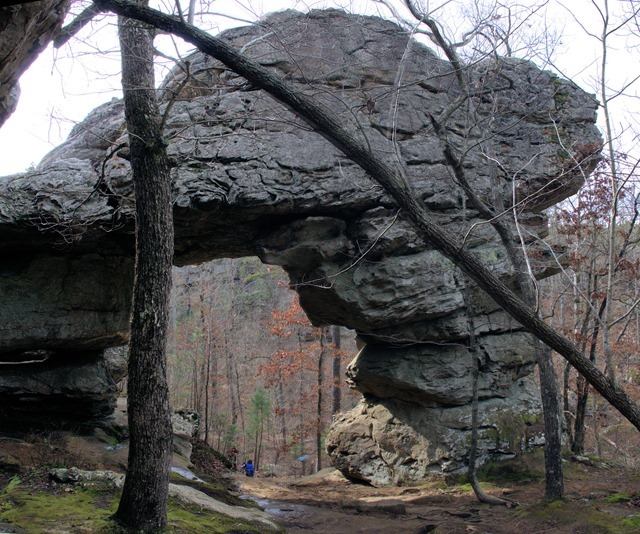
Today, we drove over to Petit Jean State Park and hiked the Seven Hollows Trail. It’s a 4.5 mile hike that is quite strenuous in places. The trail-head sign said to allow 4 hours to hike it. We finished in about 2 hours and 45 minutes. The parking lot was full when we got there so we parked in the parking lot of a different trail a short ways down the road. That added a bit to our hike so we may have been closer to 5 miles.
My fitness level is not yet where I would like. I was struggling on the steepest areas of the last half of the trail. The last mile or so was a steady upward slope.
We were close enough to home that we actually ran into someone we knew, a young man who works at the gym we go to.
One of the features along the trail referred to as a natural bridge, but it is actually a natural arch. To get this picture – which is better than the view from the trail – I climbed up through the arch.
Petit Jean Natural Bridge is actually an abandoned natural arch eroded through Hartshorne sandstone. It is located in Petit Jean State Park in Conway County, Arkansas. Access is via the Seven Hollows Trail, a 4.5 mile loop. It has a span of 30 feet, a height of 22 feet, a width of 23 feet, and a thickness of 20 feet. (The Natural Arch and Bridge Society)
This type of natural arch is invariably isolated and the lintel is arched. There are two roughly vertical abutments, each having a vertical rise greater than its horizontal extent. For many natural arches of this type, the lintel and abutments form a single strand of rock whose breadth varies little over most of its curved length. In other examples, one of the abutments is noticeably broader than the lintel and other abutment, but this broadening is roughly in the plane of the opening aperture. Natural arches of this type are considered old, i.e., at the end of their lifecycle. Although there is no conclusive evidence for a specific formation process, it is clear that the natural arch continues to survive due to compression strengthening. Compression strengthening made the remnant rock more resistant to erosion than the rock that once surrounded it, and hence, gave it its characteristic arched shape. This type of natural arch is rare. (The Natural Arch and Bridge Society)

